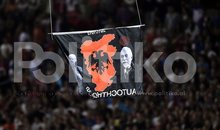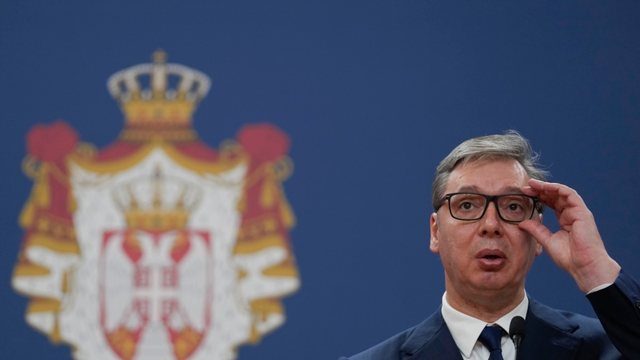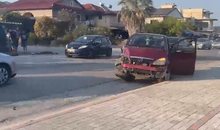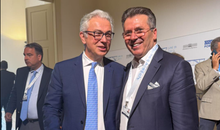
 Flash News
Flash News

Amid months of student protests, authorities in Serbia are announcing the adoption of a "people's declaration" for Vojvodina, an autonomous province in northern Serbia.
This step is said to be taken in response to alleged separatist initiatives in the protests.
Serbian President Aleksandar Vučić said on February 7 that, in recent weeks, initiatives to grant Vojvodina greater autonomy have resurfaced.
On his Instagram account, Vučić said that with some messages "they demand that Vojvodina become a republic, with some they demand that the Vojvodina language be spoken, and with some others they want Vojvodina to separate from Serbia."
He did not specify who sends such messages.
Other officials from the ruling Serbian Progressive Party have also claimed that "separatist demands" are part of the protests in Serbia.
The Serbian presidency did not respond to Radio Free Europe's questions about these initiatives, nor about the exact reasons for adopting the aforementioned declaration.
REL also contacted Milenko Jovanov, head of the Serbian Progressive Party parliamentary group, but he did not respond either.
Aleksandar Popov, from the non-governmental Center for Regionalism in Novi Sad, tells Radio Free Europe that the Serbian government's claims about Vojvodina's separatism are part of a "divide and rule" strategy.
"None of the public figures, neither from the opposition, nor from the people targeted by the pro-regime media, have so far mentioned even the 'V' for Vojvodina when it comes to the changes that are needed," says Popov.
The student protests, according to him, have shown unity and speak only about the main demands, "which are for the institutions to start working."
Students - who have been blocking faculties in Serbia for months, due to the death of 15 people from the collapse of a shelter at the Novi Sad Railway Station - demand the publication of full documentation for the reconstruction of this station, the punishment of those who attacked students in the protests after the tragedy, the suspension of procedures against arrested protesters, as well as a 20 percent budget increase for higher education.
Since that tragedy, several protests have been held in Serbia, in which other citizens have also participated. However, in them, the organizers have not said that the secession of Vojvodina is their demand.
Vučić said on February 7 that he would oppose "separatism" through democratic and political means.
"Vojvodina is Serbia. Forever. There is no surrender or retreat before those who want to destroy our country," Vucic wrote in an Instagram post.
Outgoing Serbian Prime Minister Miloš Vučević told Pink Television on February 2 that the opposition wants the secession of Vojvodina and sees the protests as an opportunity for its plans.
The Speaker of the Serbian Parliament, Ana Brnabić, told Pink Television on January 12 that the demands of students organizing blockades at faculties are political, and that the organizers of these blockades are not "autonomists", but "separatists" and want Vojvodina to secede from Serbia.
Some opposition representatives have said that these claims are unfounded and that the students in the blockade are not cooperating with the opposition on their actions.
Radio Free Europe did not receive a response to these claims from the students who have blocked the Faculty of Philosophy in Novi Sad.
In January, graffiti "Republika Vojvodina LSV" appeared in various parts of Novi Sad, the Serbian news agency Beta reported at the time.
The opposition party, the League of Social Democrats of Vojvodina (LSV), distanced itself from this.
Beta Agency reported that another banner with the inscription "Republic of Vojvodina" was hung on the Varadin Bridge in Novi Sad on January 23, and that its display was secured by the municipal police.
Radio Free Europe/Radio Liberty received no response from either the municipal police or the city of Novi Sad regarding these allegations.
According to Popov, the declaration on Vojvodina "has no legal status, just like the declaration adopted in the All-Serbian Assembly."
At this assembly, which was a joint session of the governments of Serbia and Republika Srpska, held in Belgrade on June 8, 2024, the Declaration on the Protection of National and Political Rights and the Common Future of the Serbian People was adopted - a 49-point document.
This document was adopted in July by the Serbian Parliament and, among other things, states that the Serbian people represent a single entity.
Popov says that the declaration on Vojvodina would have legal weight if a "referendum on the abolition of Vojvodina's autonomy" were held.
"All existing legal and constitutional procedures for establishing or abolishing existing autonomies should be implemented," he emphasizes.
Popov believes that the separatism thesis "has no basis in reality," but that its purpose is "to repair the damage caused by all the wrong moves the government has made."
"The consequences could be catastrophic if [the government's] plan to create divisions between the people of Vojvodina and the rest of the population in Serbia succeeds," says Popov.
The Serbian constitution states that this country has two autonomous provinces, Vojvodina and Kosovo, although the latter has been an independent state since 2008, but Serbia does not recognize it.
Under the Constitution, the proposal to create new provinces or to abolish or merge existing autonomous provinces is confirmed by citizens through a referendum.
The autonomous province in Serbia has its own institutions and revenues, manages property, has symbols and determines how they are used./ REL
Latest news


Not only the body, swimming also helps the brain
2025-07-05 21:02:49
"Be careful with the water", Alimehmeti warns about the health risks of summer
2025-07-05 20:39:10
PSG beats Bayern Munich 2-0, advances to Club World Cup semifinals
2025-07-05 20:19:38

Two vehicles collide on the Elbasan-Peqin axis, drivers injured
2025-07-05 19:26:29

What does Zelenskyy have more than Zegjineja?
2025-07-05 18:45:26

Fiscal peace, but at a cost
2025-07-05 18:00:10
'Bankers' tax evasion, Chinese CEO and former director jailed
2025-07-05 17:39:21
Kyle Walker joins English club on two-year deal
2025-07-05 17:20:24
Two cars collide on the Saranda-Delvina axis, 4 injured
2025-07-05 17:05:29
Touching gesture! Liverpool will pay Jota's family's salary until 2027
2025-07-05 16:45:18
The zodiac signs that cheat most often
2025-07-05 16:25:53

"I asked for the dismissals", Dredha tries to soften Rama's 'blow' in Vlora
2025-07-05 15:48:49
Bomb threat in Parliament, prosecutor: It was a lie
2025-07-05 15:22:28

Bardhi: The recount revealed how greedy Zeqine Balluku is in stealing
2025-07-05 14:44:29
Knife wound on the secondary road Tirana-Durrës, perpetrator sought
2025-07-05 14:37:54
Tears and pain, Diogo Jota is escorted to his final home
2025-07-05 14:21:34
Success starts with yourself! Simple ways to invest in personal development
2025-07-05 13:58:50
Unlicensed firearms found in apartment, 50-year-old arrested in Lushnje
2025-07-05 13:43:11

Tirana Court remands Skerdi Sina to prison
2025-07-05 12:59:34
Cocaine laboratory in Greece, here are the Albanians arrested and wanted
2025-07-05 12:40:16
Directed Justice/Vangjeli: SPAK does not investigate any scandal involving Rama
2025-07-05 12:22:03

Bomb alert, Police remove MPs and media from Kosovo Parliament building
2025-07-05 11:48:16
"The will of the people" and the irony of ordered resignations
2025-07-05 11:32:05
Summer drowning risk: How to enjoy the water without risking your life
2025-07-05 11:20:27
Fire situation in the country, 16 fires reported in 24 hours, 4 still active
2025-07-05 11:07:04
Car hits pedestrian at white lines, injured in serious condition in Vlora
2025-07-05 10:59:58
Mosquito-borne diseases are a growing problem in Europe
2025-07-05 10:44:13



One of Sweden's most dangerous and wanted criminals arrested in Turkey
2025-07-05 09:38:29
Foreign exchange/ How much foreign currencies are bought and sold today
2025-07-05 09:18:38

"Don't be influenced by the opinions of others", today's horoscope
2025-07-05 08:40:50

Morning Post/ In 2 lines: What mattered yesterday in Albania
2025-07-05 08:02:07

Trump says he's ready to raise tariffs to 70% on some countries
2025-07-04 22:35:52
Tre shenjat e zodiakut që do ‘pasurohen’ në Korrik
2025-07-04 22:05:09
Gaza War: Hamas Accepts US Proposal for 60-Day Ceasefire
2025-07-04 21:50:10
Autocracy in Albania, Fuga: Governance has gotten out of control
2025-07-04 21:40:51
Meta: Agriculture on credit, the new fraud!
2025-07-04 21:26:39




Vote recount in Durrës ends without changes
2025-07-04 20:12:54
Gas station explodes in Rome, 25 injured (VIDEO)
2025-07-04 20:00:20

These afternoon habits often sabotage weight loss
2025-07-04 19:39:28
Former Arsenal player Thomas Partey accused of rape
2025-07-04 19:24:21
Shepherd disappears without a trace in Delvina
2025-07-04 19:14:31

Bardho gave Zegjine's mandate/Braho: Unfair! It violates the electoral system
2025-07-04 19:01:08


Rapid developments in the Sultanates!
2025-07-04 18:00:06



Italy tightens rules for skateboard traffic
2025-07-04 17:20:18

Unusual for the time, dense fog covers the coast of Vlora
2025-07-04 16:48:01


Accident on the Shkodra-Lezhë axis, one dead and 3 injured
2025-07-04 16:14:19
Albania with fewer requests for asylum and Albanian citizenship in 2024
2025-07-04 16:06:57

Albania last for quality of life, DP: Technical government is the solution!
2025-07-04 15:42:30
Nico Williams says "No" to Barcelona, signs with Athletic Club until 2035
2025-07-04 15:33:35
Fires in the country, four fires are still active, what is the situation?
2025-07-04 15:24:20

Summer brings big changes for these 4 zodiac signs
2025-07-04 15:00:04
Osmani: MPs need to agree to a secret ballot for the Speaker of Parliament
2025-07-04 14:51:09
Serious accident on the Peqin-Elbasan axis, two injured
2025-07-04 14:37:56

GJKKO leaves in force the security measure for the head of the KPP
2025-07-04 13:58:17
Who will replace Ilir Meta and take over the leadership of the PL?
2025-07-04 13:50:36
Berisha: Dismissal of directors in Vlora, another act of 'scapegoats'
2025-07-04 13:41:46




Librazhd/ In a serious psychological state, the young man consumes pesticides
2025-07-04 13:05:07


Weapons trafficked from Kosovo to Albania, two arrested, 8 pistols seized
2025-07-04 12:33:28
Konsumimi i tepërt i çokollatës, ja cilat janë dëmet që shkakton në organizëm
2025-07-04 12:23:35

Fires in the country, 21 fires in the last 24 hours, 4 still active
2025-07-04 12:00:19
WB calls for debt transparency: Albania to publish details of every loan
2025-07-04 11:50:05
